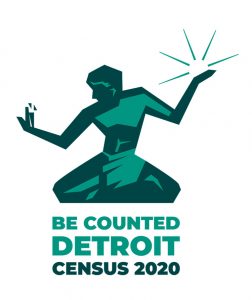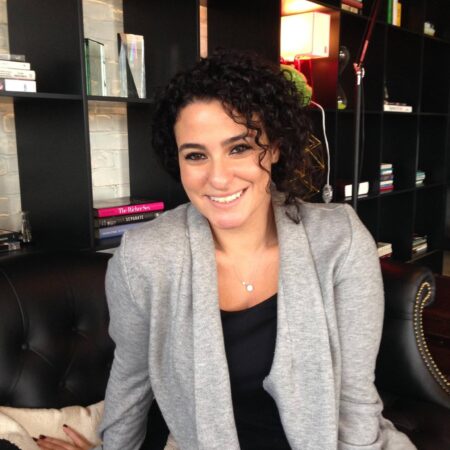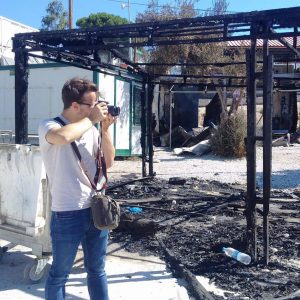The City of Detroit has a new Chief Development Officer, Sirene Abou‐Chakra, an individual with a history of working with political organizations, the technology sector, as well as the previous Director of Development for the City of Detroit. A graduate of the University of Michigan, Abou‐Chakra took a job with Google in Mountain View, California, back in 2007, working with the company, she spent time in Dubai, as well as Washington DC.
Working with Google’s political team while in D.C., Abou‐Chakra advised candidates on their digital strategy, and held this role for around ten years, before stepping down after the 2016 election. She returned to Detroit and took a position within the City of Detroit Government, where she was the Director of Development, before eventually becoming the new Chief Development Officer.
Taking to the role of Chief Development Officer at an increasingly unique and challenging time for the city, we talk with Abou‐Chakra about her role, the work she’s doing, and what the future will look like for her office amid COVID-19 and an ever-changing reality.
THE DAY-TO-DAY ROLE OF A CITY CHIEF DEVELOPMENT OFFICER
The role of Chief Development Officer means that I oversee the 300 plus million dollars over the last couple of years, at least that the city competes for and wins privately and publicly. So, I manage our relationships with the JP Morgan’s, the Quickens, and the Kresge’s of the world, while also making sure that Detroit is winning its fair share of federal and state grants that are available. I prioritize with the mayor, the city’s biggest initiatives, and then I go out and I fundraise for them.
This last year, the workforce was always a top priority. So, making sure that Detroit At Work, has the resources it needs so that Detroiters are getting trained and have access to career technical education or whatever the case might be or that Grow Detroit’s Young Talent [GDYT] is supported and fundraised for, that remains a top priority for the city all the time. But it’s also about things like fundraising for the Strategic Neighborhood Fund, the Affordable Housing Leverage Fund, and the Census, which has been a major priority for us this year.
Now with everything related to COVID, we have been working closely with United Way and nonprofits on the ground to make sure that they’re getting the support that they need, that residents don’t have food security issues, and that we can support our testing sites and our homeless quarantine sites. So obviously, COVID has now become the number one priority in terms of making sure that we are having an adequate response. I think, you know, based on what we’ve been seeing in the last month or so Detroit has been a leader in terms of stepping up to create a testing site at the State Fairgrounds now expanding the testing to not just people with a doctor’s note or referral, but people that are essential workers.
We’re also making sure that Detroiters, 30 percent of which don’t have access to a car, can get free transportation to the testing sites and that are homeless population is taken care of and supported. During this time, those are just some of the priorities that we have now.

THE 2020 CENSUS WAS ONE PROJECT WORKED ON BY THE OFFICE OF CHIEF DEVELOPMENT OFFICER.
YOU STARTED AT YOUR ROLE THIS APRIL, HOW HAS THE CRISIS CHANGED THE ROLE OF CHIEF DEVELOPMENT OFFICER?
I spent two years preparing for this role. We had a process set up, relationships, set up, and then day one of my job as Chief Development Officer was day one of COVID-19 lockdown. You know, just as a leader, you can have a plan, and you need to be able to completely shift to that plan when the needs of the city or your team change. And that’s exactly what happened. So, while we’re still focused on many of the same projects that we were focused on prior to COVID-19, we obviously have a crisis on our hands, and the health and the well being of our residents has become the number one priority.
Just to recap some of the things I mentioned before, we worked on getting the testing site up and running, where 700 or so Detroiters a day were getting tested, those that had symptoms and referrals, to now expanding it so that essential workers have access to that. Making sure that our first responders not only had access to the testing but that they had safe quarantine sites so that they didn’t have to go back home to their loved ones that might be at risk. We’ve also started this program called Feed the Frontlines, which both supported our restaurants and our first responders, at the same time.
So, there are initiatives like that that we were very creative in launching and fundraising for right now. You know my focus is to ensure that the public dollars that are coming from the federal government are fulfilling some of our basic needs and that the private dollars are being used to support some of the things that aren’t covered by FEMA.
HOW HAVE YOU MANAGE TO FOCUS ON THE ONGOING CRISIS WHILE ALSO KEEPING A FOCUS ON THE ORIGINAL PROGRAMS YOU HAD PREVIOUSLY MENTIONED?
You know I’m still figuring that question now because I think, like many of us right now, there is no work-life balance. You’re working from home, you’re not formally leaving the office like we used to, and so the boundaries of our lives are totally blurred right now. The city is in crisis, and so the texts probably start at 7 am in the morning, and I’ve got calls that go till 9, 10 pm every evening, and that’s just the reality. Right now, in the entire city, it’s all hands on deck.
The mayor outlined some pretty serious cuts the city’s going to have to take that were generally hard cuts to make, but we’ve been thoughtful in regard to how we do that and how we can support our employees while making those cuts. But, the reality is, we’re all hands on deck we’re working around the clock, we’re triaging as necessary, and you know, everything’s got a COVID spin next to it. So, if it were a priority before, I’m sure COVID has made it even more so one now.
Digital Inclusion was a big priority for the city prior to COVID. When it hit causing our students to stay at home, whereas other school districts could do it pretty easily because they’ve got the tech and the broadband at home, that wasn’t a reality in Detroit because of the levels of or like the lack of access to tech and consistent broadband at home, so it was always a plan to address digital inclusion.
ON THE TOPIC OF DIGITAL INCLUSION, DID YOUR OFFICE PLAY A ROLE IN THE RECENT “CONNECTED FUTURES” PROGRAM?
We were one of the many players that supported the effort. As the mayor and everyone mentioned, the other day, with Reverend Anthony, even the faith-based community was involved. So that was one of those situations where you actually saw everybody involved, the philanthropic community, the foundation community, the corporation’s, city government and DPS all working together.
You have the mayor’s office and my team supporting the efforts to raise those funds and to make this a reality. So this is the ultimate team collaborative effort that I think many cities would really envy. So yeah, this is one we’re really proud of.
CAN YOU TELL US A LITTLE BIT MORE ABOUT THE WORK BEING DONE WITH THE 2020 CENSUS, AS WELL AS THE GOAL LINE PROGRAM?

THE CHIEF DEVELOPMENT OFFICER ASSISTED WITH THE GOAL LINE PROGRAM.
So as you know, the Census is incredibly important. Looking back, Detroit had the lowest response rate of any major city in the US, and when we think back to 2010, what was happening at that time was we were coming off of the biggest financial crisis that many of us have had seen. The reality is that so many of our resources, Medicaid, school lunches, child care, redistricting rates, all of these things depend on data arrived from the Census. So it was the mayor’s foremost goal this year that we had an incredibly robust operation to get the response rates to 70%, which was the goal that we set internally.
While there are state efforts, and federal efforts to increase participation in the Census, we knew we needed a Detroit specific plan to get our numbers up. And so, that means we needed a Detroit specific budget to make that plan happen. I worked closely with local foundations, national foundations, and corporations to raise over $3 million to support the efforts to get the census numbers, where they should be.
The Goal Line program is the after school program at the Northwest activities corner. It’s both a transportation loop and an after school program that the Community Education Commission, and nonprofits here in the city, operate. We were there from the very beginning before it was even called the Goal Line to help understand how this initiative would be built and would be operated, who it would serve, what it would look like, the types of enrichment classes, and how it would provide the transportation, to areas that it would address.
We worked with many funders to raise millions of dollars every year to get hundreds of kids in the program over at the Northwest activity center. You know this was pretty remarkable in that we were able to have both charter schools and DPS CD schools, working together to figure out how to take advantage of this program, and to get their kids all to the northwest Activities Center. The board is comprised of both charter school leadership and DPS CD, scholarship, and philanthropic partners.
AS THE CHIEF DEVELOPMENT OFFICER, WHAT DOES THE FUTURE LOOK LIKE FOR YOUR OFFICE?
Detroit has been a leader as it relates to how the immediate response of COVID is going. Detroit is looking to continue to lead when the recovery from COVID begins to happen, and those are things that we’re already starting to think about. There’s no shortage of opinion pieces on the effects of COVID on globalization, on supply chain diversity, on how manufacturing, at least in part, could come back to the U.S.. I’m saying all that because we’re already starting to work with deep thinkers on how does Detroit position itself to be the place that leads. When it comes to COVID response. How do we ensure that Detroiters are ready to take on the job, as they will exist in a post COVID world?
We know that that world is going to involve more distance, so we’re already starting to think about doubling down, and we’ve already started to catch so that people can learn from home, and people can work from home. There are different industries that are going to see a demand for more workers, and we plan to train Detroiters to be ready to take those jobs. There are going to be industries that are looking to relocate. We want Detroit to be the place that they relocate to.
A number of us are starting to talk to thought leaders and partners about how to make Detroit competitive in a world that’s going to look much different after COVID, and it all starts on making sure that the traders have the tools that they need to compete. And, that’s already in the works right now.






















